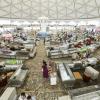Search
Displaying Results 1 - 25 of 63
During its recent mission in Turkmenistan, a UNECE delegation presented a proposal for a new analytical project - “Trade and Innovation for Sustainable Development of Turkmenistan” - to the government and international stakeholders, aimed at supporting the country to enhance innovation governance
During her recent two-day visit to Turkmenistan UNECE Executive Secretary Olga Algayerova spoke at international conference “Dialogue is a Guarantee of Peace” in Ashgabat and discussed areas of cooperation with the highest government officials, focusing on future circular, digital and green
Turkmenistan has made significant progress in increasing the share of the non-state sector in its GDP (excluding fuel and energy), which reached 71.1% in 2022. Public-Private Partnerships (PPPs) are considered by Turkmenistan as an important tool to further advance the implementation of the SDGs
The role of transport and transit corridors in ensuring international cooperation, stability and sustainable development will be discussed at a high-level international conference in Ashgabat, Turkmenistan, from 3 to 4 September 2014. The event is organized by the Government of Turkmenistan, in
A high-level mission of United Nations experts has reviewed the plans and preparations for the upcoming census of Turkmenistan, due to take place on 17-27 December 2022. Working alongside the State Statistics Committee of Turkmenistan, the delegation— a multi-agency team consisting of experts from
As the global economy emerges from the COVID-19 pandemic and governments strengthen efforts to “build-back-better”, trade as an engine of growth has re-emerged in policy agendas. For developing countries and countries with economies in transition that are still in the process of accession to the
UNECE, WTO and the Government of Turkmenistan brought together trade negotiators, vice ministers and other high-level officials from SPECA countries – Azerbaijan, Kazakhstan, Kyrgyzstan, Tajikistan and Turkmenistan – as well as their neighbour, the Islamic Republic of Iran, to discuss four key
The COVID-19 pandemic and the war in Ukraine have disrupted global value chains and created new challenges for achieving the Sustainable Development Goals (SDGs) enshrined in the 2030 Agenda. This became particularly consequential for many economies in Central Asia, which have strong trade ties
An underappreciated and often overlooked issue when developing safe and sustainable transportation systems in any nation is thorough and up-to-date statistics on road transport and road safety. Good, reliable statistics support governments and decision makers to understand what issues to address
High-level decision makers from Afghanistan, Azerbaijan, Kazakhstan, Kyrgyzstan, Tajikistan, Turkmenistan and Uzbekistan have come together for strengthened action to harness trade as a driver of sustainable development.Under the auspices of the Trade Working Group of the United Nations Special
Following the launch of the draft proposal for a United Nations Road Safety Fund at the Global Sustainable Transport Conference held in Ashgabat, Turkmenistan, in November 2016, and after initial consultations, UNECE has set a deadline of 15 August 2017 for submission of comments on the latest
The nations of Central Asia – Kazakhstan, Kyrgyzstan, Tajikistan, Turkmenistan and Uzbekistan – together with Afghanistan and Azerbaijan, are undergoing significant transformations as they advance in their implementation of the 2030 Agenda for Sustainable Development. However, these countries
Countries of the Commonwealth of Independent States (CIS) chose largely different models of political and economic reforms in the transition from a planned to a market economy over the period 1996- 2014. This led to the emergence of different demographic and urbanisation dynamics, with
The challenges posed by climate change to Central Asia, the likelihood of more frequent compound water-energy-food crises and the growing strain on the shared water resources of the region due to economic development and demographic growth require more intensive joint efforts by the countries of
This year, for the first time, the UN Special Programme for the Economies of Central Asia (SPECA) is chaired by Afghanistan. The Government of Turkmenistan generously offered to host the SPECA Days, on 4-5 December, in Ashgabat under the chairmanship of Afghanistan. On 4 December, the SPECA
Central Asia lacks a coherent regional approach to address water, energy and environment challenges, which are largely transnational and can only be tackled in a collaborative manner. To remedy this situation, water, energy and environment specialists from seven countries (Afghanistan
The COVID-19 pandemic, the subsequent economic downturn, and the far-reaching negative effects of the war in Ukraine, have created additional development challenges for Central Asian economies. This includes the countries of the UN Special Programme for the Economies of Central Asia (SPECA),
How to improve inland transport connectivity between Europe and Asia? What are the specific needs of producers, shippers, traders and freight forwarders along Euro-Asian routes? These were the main themes discussed by transport officials, representatives of the private sector and academia, and
In 2013, gross domestic product (GDP) increased about two per cent both in North America and in the countries of Eastern Europe, the Caucasus and Central Asia (EECCA), as compared to the previous year. Growth remained modest in the EU, while in the Euro zone GDP diminished by close to 0.5 per cent
Central Asian economies are taking practical steps to push for a more knowledge-based path towards economic development to overcome their remoteness from major markets and exposure to fluctuations in commodity prices.The Government of Tajikistan held discussions with domestic innovation
From 25 to 27 April 2017, representatives from key authorities and stakeholders from Kazakhstan, Kyrgyzstan, Tajikistan, Turkmenistan and Uzbekistan along with experts from the Russian Federation met to discuss issues related to dam safety in Saint Petersburg, Russian Federation, as part of
Technological, economic, and institutional innovation will be essential to achieve the Sustainable Development Goals (SDGs) set out in the 2030 Agenda for Sustainable Development. To this end, the UN Special Programme for the Economies of Central Asia (SPECA), which includes Afghanistan,
Source: UNECE Statistical Database (www.unece.org/stats/data), Eurostat, CISSTAT and national statistics In 2015, in the United States gross domestic product (GDP) increased by 2.4 per cent compared to the previous year – the same growth rate as in 2014. In the European Union (EU), GDP
Transitioning towards a knowledge-based economy away from a resource-intensive model of economic growth is central for sustainable development among the seven countries of the UN Special Programme for the Economies of Central Asia (SPECA) - Afghanistan, Azerbaijan, Kazakhstan, Kyrgyzstan,
Source: UNECE Statistical Database (www.unece.org/stats/data), Eurostat and CISSTAT In 2016, the gross domestic product (GDP) of the European Union (EU) increased by 1.9 per cent compared to the previous year. GDP also grew in the USA by 1.6 per cent. In the countries of the Commonwealth of









